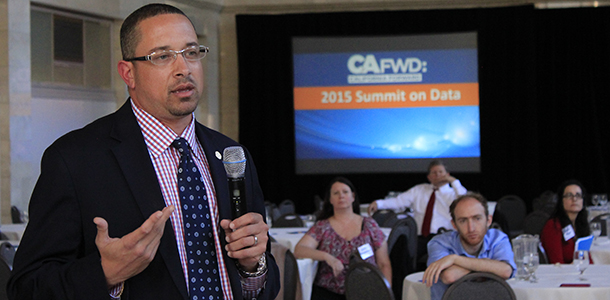
Kish Rajan, director of the Governor’s Office of Business and Economic Development, addresses attendees at CA Fwd’s 2015 Summit on Data. (Photo Credit: John Guenther)
On Wednesday in Sacramento, more than 150 people gathered to push forward the cause of open data in California. It’s second year in a row CA Fwd has hosted the Summit on Data to help turn the page so that government data is not just open, but valuable and accessible to the public, entrepreneurs and advocates.
Assembly member Phil Ting (D-San Francisco) kicked things off with the announcement of legislation to create the California Open Data Act, which would allow the appoint of a Chief Data Officer tasked with presiding over a centralized online information portal for state agencies to submit standardized data for public access. The bill requires state agencies and departments to appoint a data coordinator to work with the Chief Data Officer to ensure the transference of information under the Act.
“We know open data leads to more accountability and efficiency,” said Ting in a release. “As the home of Silicon Valley, California should be an open data leader. Data crunching technology is readily available and inexpensive, making it easier than ever for citizens to assess the performance of their government. We must seize the potential of the next frontier in open government.”
Speaking about a frontier from the past, speaker Michael Chui, partner at McKinsey Global Institute, shared that the government’s role as data provider is not a new one and harkened back to Lewis and Clark, sent to gather data on the new territories of the U.S. “not only for the government but for others.” “So recognizing at that time…that data was not only part of the government function but to provide some insight for people outside the government as well,” said Chui.
While Chui said the potential economic impact of open data has been calculated at $3 trillion, he added that data begins to real value once government creates a policy framework to provide data that is accessible to the biggest number of people but also readable by computers.
“Who’s tried taking data out of PDF and put it into a spreadsheet?” asked Chui.
Looking beyond making money and holding government accountable, Emily Shaw, the national policy manager at the Sunlight Foundation, argued that open data is important because, as state and local governments have reduced public worker ranks, there are outside organizations ready to make use of it to help government operate more efficiently.
“There is a rich group of organizations and individuals, civic hackers, journalists, nonprofits, research institutions, data companies that are interested in helping government work better through common skill sets,” said Shaw.
But to get that done, data needs to be not just open but standardized across agencies and jurisdictions. And that benefits not just residents but also other public agencies looking for government data. Steve Spiker of the Urban Strategies Council told the audience about real estate data sold by public agencies to private companies at an enormous cost, but is also sought after by other public agencies and advocacy groups like his.
“What that means is public data, the transactions of houses and foreclosures on homes…that information is sold to private companies only and they then sell it back to us,” said Spiker. “Why do we need to fight with every single county to get access to this information?”
Agencies and advocates also suffer from having “clean data” that is useable and also having too much data in databases without knowing the value of the information.
“The biggest cost of our work is data preparation…finding the problem, cleaning it up and making it useful for everyone,” said Eric Busboom of the San Diego Regional Data Library, a nonprofit that helps with digging into civic data. “And for a lot of our work, we feel like putting ourselves out of business, by eliminating the preparation costs.”
Speakers at the Summit presented open data projects from inside and outside of California to show what’s possible. Nicole Neditch, fellowship director at Code for America, said a project with the city of Albuquerque opened up transit data to the public and realized $180,000 in savings in one year by reducing phone calls to the city.
Emily Shaw of the Sunlight Foundation shared info on the “Heat Seek” project in New York City, where sensors were placed in apartment buildings to check up on whether landlords are adequately heating their buildings, as required by law.
Post-lunch, the attendees broke into workgroups and brainstormed opportunities to determining the value of data and how to get things standardized. These included:
- Developing a dollar figure on the return on investment of data policies
- Establishing open data policies locally and at the state level
- Encourage regional data sharing
- Providing a one-stop-shop for data
CA Fwd has been putting on a data “roadshow” over the past year to gather innovators inside and outside of government and help increase the use technology to improve results, to promote pioneers and best practices, and to identify how regulations and statutes can be modernized to accelerate the adaptation of technology in the service of the public interest.
The goals of this work are to help cities and civic entrepreneurs create more jobs, make government services more cost-effective, to increase public engagement, and to encourage greater accountability for results.
“We will be addressing those challenges of economic dislocation of people out there today that don’t know they have a chance to participate in the economy today moving forward,” said Kish Rajan, the director of the Governor’s Office of Business and Economic Development (GO-Biz), who closed the summit. “They’ll know that they’re going to have quality of life in their communities. We can meet those needs and you’re helping us get there, if you’re successful in what you’re doing today.”

